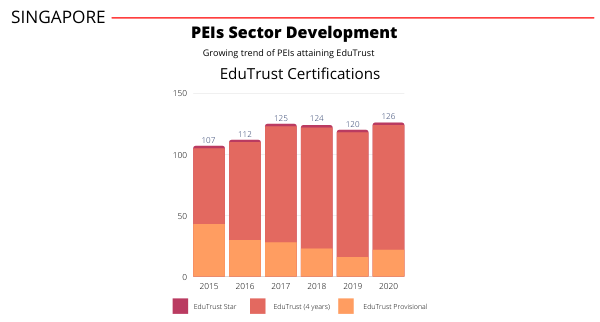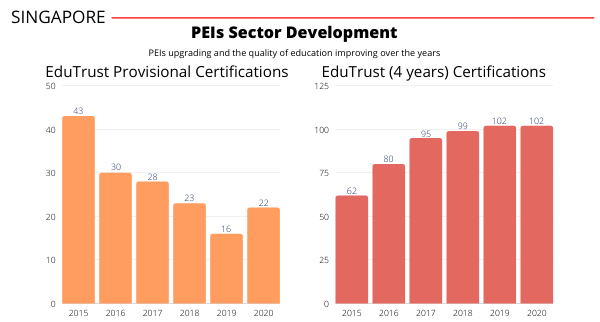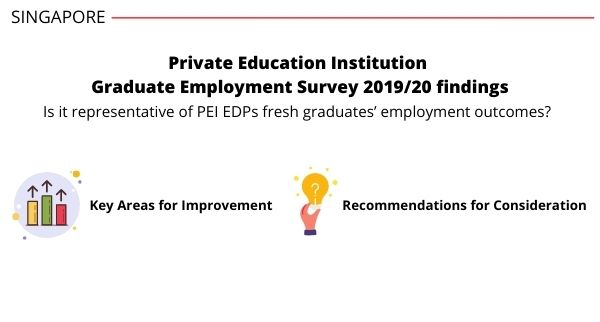With the COVID-19 pandemic situation constantly being in flux around the world, we have constantly evolved to the ever-changing restrictions and advisories issued by our governments. In this article, the EV Industry Research Team highlights issues faced by Private Education Institutions (PEIs) in Singapore in the following areas of student recruitment, business continuity, online delivery of classes and quality assurance. We wonder if educational institutions abroad face the same challenges and employ similar strategies as we do.
Biggest impact – Student Recruitment & Business Continuity

Border restrictions in the last 1.5 years have severely impacted Singapore’s Admission Exercise for International Students (AEIS) and directly affected Singapore’s Private Education Industry from its traditional ways of international student recruitment. International students are a significant revenue stream for PEIs and since the pandemic hit, PEIs have faced challenges of recruitment and retention.
The easing of some border restrictions has been a double-edge sword. On one hand, it has allowed some students from selected countries into Singapore. On the other hand, the extensive entry eligibility, requirements and process for international students entering on student pass have increased barriers to entry. As such, the various potential international student markets find that the obstacles outweigh the benefits of pursuing education options here at this time. These markets have also grown wearier of travel and studying abroad. As a result, PEIs have been moving away from their recruitment strategy that relies on agents to bring in international students and are exploring other business continuity strategies to ride out the storm of the pandemic.
Recruiting Students Locally and Creatively

EV has noticed a trend of PEIs recruiting transfer students from their local competitors. There has been some success with this interim strategy and international schools are following suit. Evidently PEIs that are unable to deliver quality education and support to their students will see some of their students transfer to other schools that meet their expectations. Thus, the challenge for PEIs then would be to retain its current students and minimise their student transfers.
Additionally, PEIs have also had to re-evaluate the needs of the students they are recruiting. In addition to transfer students, there are two other types of students they can reach out to – those who are academically inclined or those that are looking for shorter degree courses.
Consolidation, Differentiation and Joint-Partnerships

With the PEI Industry taking a substantial hit from border restrictions where their markets of student recruitment have been fragmented, we also have seen a trend of PEIs consolidating to pool resources, differentiating and/or entering joint-partnerships.
To attract students, PEIs have sought to increase their differentiation in academic programmes to stand out in the competitive private education market. Even new and emerging PEIs are being business savvy by playing to niche markets with different business models.
Our Lead Strategic Researcher has also observed that PEIs are increasingly looking to setting up joint-partnerships as we see an increasing availability of programmes being established by universities from around the world. These overseas universities from the US, Canada, Australia, etc., have evaluated that Singapore is an advantageous location to set-up their recruitment expansion since most students are unable to study abroad. These interim measures would enable these universities to still secure potential international students that were interested in studying abroad with their institution prior to the pandemic. In this way, they will also be able to sustain interest in the university and their programmes on the ground in foreign countries. Evidently, PEIs have to understand the different market segments and needs, and be innovative in how they meet these needs with their partners to offer quality experiences for students.
Exposing areas for improvement within the PEI Industry

The pandemic has exposed PEIs vulnerabilities and no one is spared. The EV Industry Research Team has gathered on-the-ground sentiments and observed trends within the Private Education market that exposes PEIs vulnerabilities in the areas of management, technology and Quality Assurance (QA).
Management to Capitalise on and Continue to Expand their Network

With the pandemic throwing a spanner or wrench into works of normalcy, and the world scrambling to adapt, the competency of leadership and management in organisations have been put in the spotlight. Leadership of PEIs management included. In these turbulent and uncertain times, we look to the leaders to steer PEIs in the right direction to ensure survivability through these times and onto the other side.
The competency and capability of PEIs management lies in their ability to capitalise on and expand their network to ensure that they have the best information available to make business decisions. While this may be an obvious statement, it is often overlooked and yet can make the world of a difference of how a PEI can move forward. For example, many PEIs used to recruit students from China. In late July 2021, news on China’s tuition ban on core subjects on weekends and public holidays was released. Some PEIs owned by local business owners without connections to China may not get the news until it was released by the press. Only then would they start adapting their business strategies, but it would be a little late compared to their competitors. PEIs management with Chinese business connections would have heard building on-the-ground sentiments and pre-warnings for months and have already strategized and executed plans to build awareness in China. They would have understood the Chinese market’s openness and interest to explore other university options, and positioned their offerings as a viable higher education opportunity for those that do not get the gaokao results they had hoped for. Changes such as China’s tuition ban have significant impact on PEIs business decisions and it would be substantially advantageous if PEIs management had connections within their network on insider information ahead of time.
However, our Industry Research Team found PEIs in Singapore lacking in this area. Majority of PEIs have been more concerned about micro rather than macro environments. They tend to be more caught up in student recruitment through giving discounts and easing entry requirements instead of evaluating market segments that have potential and opportunity for exploration. We highly encourage PEIs management to capitalise on and continue expanding their network so that they are exposed to multitude of information that enables them to formulate effective and innovative strategies and make the best business decisions. Our Lead Strategic Researcher also stresses the importance for PEI management to infuse QA considerations to be second nature and imperative to their decision-making process (Read more about QA later in this article). These suggestions would not only make PEIs management better leaders but place the PEIs in better overall standing on all fronts.
Technological Challenges

While we have been living in a fast-paced digital era, the education sector has been known to be slow to technological reform. The pandemic has necessitated an expediated frenzy amongst the education sector for technological uptake, usage and delivery of classes. In the last 1.5 years, we have analysed PEIs adjustments in Singapore and discovered that not enough PEIs are adapting to technological changes, challenges of technology fragmentation, as well as educational institutions and educators struggling with online delivery.
Overall, we find that not enough PEIs are embracing, adapting and making online delivery of their courses available. As EV is a leading EduTrust & WSQ ATO Consultant in Singapore, we have taken our clients as a sample size and found out that only about 5% of PEIs have moved to full online delivery. The rest may only be providing supportive online delivery as their international students are unable to be in Singapore for in-person classes. Some reasons we can attribute to the technological resistance or hesitancy could be due to lack of resources, waiting for reopening of borders and complicated regulations. For instance, for a PEI’s course (diploma degree, master’s) to be made available as a fully online degree, a requirement is that the server must be located in Singapore. However, this poses as a challenge as many PEIs have been embarking on joint-partnerships with the university’s servers being located overseas where they are based.
Even when PEIs are on board with online delivery, they are at a loss of which platform to pour their resources into as there is technology fragmentation with too many options available and no clear monopoly or main online education delivery player(s) that will meet all their needs. Essentially, a PEI is searching for a one-stop solution to for all their working processes that accommodates their student administrative, and operational needs. While it sounds simple and obvious, a PEI’s day-to-day operations shows how challenging it is to find an online platform with processes that work with how the PEI’s staff work.
On one hand, for online classes, educators first started with duplicating their in-person lectures and tutorials on Zoom. Over time, educators started to explore other platforms and tech tools for various reasons – whether it was to enhance the learning experience or to make the administrative processes more efficient like having large numbers of local and international students logging in. Educators as well as students had to test and adapt to many tools before finding one that fits.
On the administrative and operational front, each school has to source for technological support in areas of storage of data, Learning Management System (LMS), School Management System (SMS) or portal, and QA while ensuring that they are able to create or source Application Programming Interface (API) software that integrates their existing systems with new ones. Unfortunately, each PEI’s needs and functions differs and if PEIs cannot afford to build or outsource a customised system, they would have to explore multiple solutions (integrated or separate). For example, staff communicate both formally on email at a slower pace while communicating rapidly on messaging apps like Whatsapp, Slack and WeChat. They then perform their tasks on the SMS or other digital systems. Miscommunication can occur between understanding what was communicated on email, messaging apps or videocalls and performing tasks across multiple systems. This wastes valuable time for PEIs as they attempt to straighten things out and causes educators and school administrators to experience technological fatigue. Therefore, purchasing or developing technological support for PEIs are no easy task when PEI managers have to take into consideration how their PEI functions, its needs, how it operates as well as multicultural, national and global studying and working arrangements. It’s no wonder people are at a loss of what to do – there’s just too many considerations to sift through that are not quite the right fit.

Another technological challenge that PEIs face is the competency gap of their educators in terms of online delivery of classes. Overall, majority of educators in the private education industry lack the awareness and ability to use online tools, training and skill to deliver online classes in a masterfully engaging and meaningful way. PEIs have reported that their older educators, especially for higher education programmes tend to have the steepest learning curve and struggle the most with online classes. Compared to the younger generation of educators, older educators find it much harder and take significantly longer to adapt to using technology in the classroom (whether physical or online).
These educators have decades of experience and preference for face-to-face and interactive classes and lecturing with very minimal technological aid. When the pandemic hit, they were forced to change very quickly and naturally this was faced with a lot of resistance, difficulty and frustration for educators, students and administrators. For instance, when older educators had technological problems when teaching face-to-face classes in school, they could immediately call a support staff who would arrive and resolve their problems on the spot with minimal disruption to teaching. However, when these older educators face problems with the online platform or internet issues at home, they are unable to troubleshoot independently and/or receive immediate and efficient assistance, and their classes get delayed or wasted.
Other issues that hinder older educators’ transition to online learning include their resistance to upgrade their equipment on their dime to facilitate teaching, and the challenges of technology fragmentation. They may not receive compensation for their purchases as they view this mode of teaching as temporary and contrary to their teaching styles. Furthermore, when PEIs test and use multiple platforms and systems, the older educators get frustrated as they have been getting used to a particular system, and are unable to keep up with the changes of switching digital tools.
QA Challenges

A key component of a PEI’s survivability, especially those with EduTrust Certifications is ensuring that they keep up with QA regulations. In the last 1.5 years, when PEIs have been scrambling to keep their doors open and with Singapore’s COVID-19 advisories, despite its importance, QA has taken a back seat. PEIs had to transit to online delivery during the 2020 Circuit Breaker, and since then they had to immediately adjust to multiple advisories and regulations such as ensuring that they have SafeEntry set-up and in use, take temperature of all students, staff and visitors, meet quotas of staff and students in school and report these to the ministries on a daily basis, all the while still operating and managing students and parents. When PEIs pivot their business strategies in such a quick manner, they often forget to take QA considerations into account and this could cause issues with meeting EduTrust requirements and risking their operations in the future. PEIs Management need to ensure that they infuse QA considerations and EduTrust requirements into their decision-making process for any business strategies.
Conclusion
With international borders closed for prolonged periods around the globe, student recruitment and PEIs revenue have been greatly impacted. PEIs have to pivot from conventional methods of student recruitment and explore other revenue streams to ensure the institution’s survivability. While these strategies were thought to be short-term, the fluctuating border closures, international advisories and each country’s regulations have forced PEIs hands to continue with these strategies for the foreseeable future. We believe that if PEIs tackle different key areas as highlighted in our research, they will be in better standing to see their PEI through and beyond these tough times.
Written by Gillian Koh, Industry Research Team at EduValue





